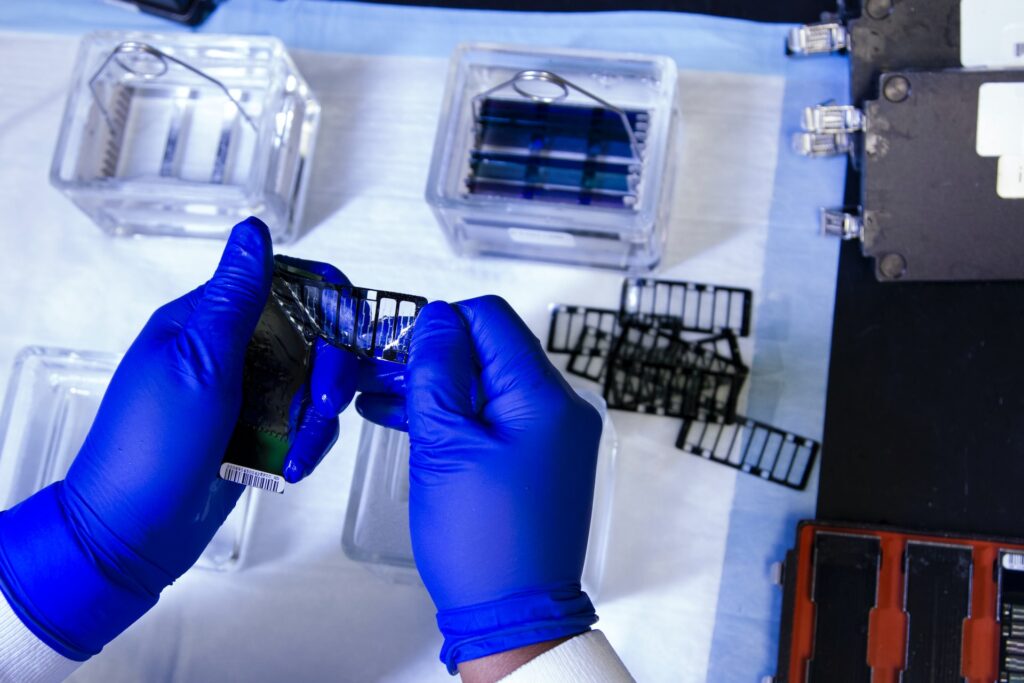Diagnostic genetic testing can help identify an individual’s potential risk for developing a rare disease.
In some cases, diagnostic genetic testing can definitively determine a medical diagnosis for symptoms that have been as yet unexplained for the patient. In other cases, it can contribute information that can lead to a correct diagnosis, pending further examination.
Diagnostic genetic testing can confirm a suspected disease or syndrome and can help direct a patient to treatment options.
This type of testing can also help identify family members at risk for the same or related diseases and conditions, which can be a hugely important benefit of genetic testing. A diagnosed genetic variant can be a key to understanding identical or associated familial health issues. Immediate family members can have an up to 50% chance of having inherited the same variant, and extended family members and relatives may also be at risk.
Is diagnostic genetic testing only used for rare diseases
Simply, no. While rare diseases are what you might imagine this type of testing is designed for, diagnostic genetic testing is also often recommended for those who may have very common diseases and health conditions.
What are some of the more common diseases I can screen for?
Celiac disease:
Not as common a disease as you might think, considering the huge trend in gluten-free eating. Only two million Americans (approximately) are affected. Celiac is an autoimmune disorder that attacks the internal tissues of the small intestine, leading to diarrhea and abdominal discomfort and pain. This reaction is set off by gluten, a type of protein found in wheat, rye, and barley.
An autoimmune condition triggered by proteins called gluten that are found in wheat, barley, and rye, celiac disease attacks the tissues of the small intestine, causing diarrhea and abdominal pain.
With many affected people showing no visible symptoms, and with similar symptoms confusing the condition with others such as irritable bowel syndrome, celiac is a disease that absolutely must be tested for if there is a family history, or if your healthcare provider thinks there is a cause.
There is no cure, and the only therapeutic regimen that helps at all is to carefully consume a strictly gluten-free diet. In some cases, it may also be necessary to prevent cross-contamination of gluten in “safe” foods. This can ward off serious intestinal damage.
Celiac disease may be attributable to genetics by up to 87%. Tests scan for particular gene variants in an immune system protein called HLA-DQ, which is encoded by a set of genes on chromosome 6.
Perhaps about 1 in 22 of those individuals with a first-degree relative with celiac disease will develop it themselves, that is, those people with a celiac-affected sibling, parent, or child. People with a second-degree relative who is celiac-affected have a 1 in 39 risk. Second-degree relatives include grandparents, grandchildren, uncles, aunts, nieces, nephews, or half-siblings.
Breast cancer and ovarian cancer:
The great majority of breast cancer diagnoses show up in women with no known family history. 5-10% of these cases can, however, be due to genetic mutations in the BRCA genes.
These genes (BRCA 1 and BRCA2) are classified as tumor suppressor genes, per the National Cancer Institute (NCI). When they mutate, they may allow rampant cell growth. Those who have gene mutations in this category are approximately 5 times more likely to develop breast cancer, and are also, according to the NCI, 15-40 times more likely to develop ovarian cancer.
According to several major studies, the BRCA genes are more prevalent in women of Ashkenazi Jewish descent.
Other common conditions that diagnostic genetic testing can screen for include, but are not limited to: age-related macular degeneration (age-related vision loss), bipolar disorder, Parkinson’s disease, obesity, and psoriasis.
Benefits of early diagnostic genetic testing for children
An early diagnosis can make all the difference to children born with a genetic health disorder. Diagnostic genetic testing is crucial to ensuring your child receives the best and most helpful treatment and care. With genetic testing results to help define and diagnose your child’s condition, you can determine which medications may be most effective for your child and which should not be used. You may be able to access new, innovative treatments, and by identifying the cause of your child’s condition early on, you may be able to avoid more invasive procedures and testing for your child. You can also gain more information about the associated hereditary risk to other family members, including siblings.
Symptoms that warrant further examination and possibly genetic testing include but are not limited to, delayed development, seizures or epilepsy, overgrowth of any part of the body, early respiratory disorders, multiple congenital anomalies, structural heart defects, or childhood-onset cancer.
My test came back positive. What does that mean for me?
Results of your diagnostic genetic testing may indicate you have an above-average risk for contracting a disease, but that doesn’t mean you will contract this disease. In the same way, results showing no markers for risk can’t guarantee that you won’t.
However, knowing you are in a certain risk category can help make decisions that can improve your health and your risk factors, for example, making changes in eating habits or quitting smoking. These new health habits may help prevent the disease from developing or may ameliorate its effects.
The first step following genetic testing should be consulting with a genetic counselor. Genetic counseling provides expert genetic advice, as well as the necessary emotional support needed when facing a rare disease diagnosis.



